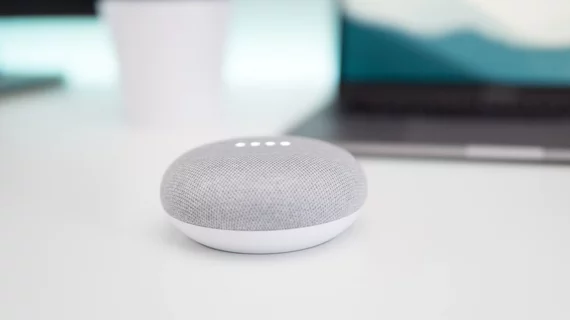Google, Amazon smart speakers assist interventional radiologists
Interventional radiologists at UC-San Francisco have adopted the popular smart-speaker system Google Home (aka “Hey Google,” “OK Google”) for use in the surgical suite.
Announcing their innovation March 24 at the Society of Interventional Radiology’s annual conference in Austin, Texas, lead researcher Kevin Seals, MD, and colleagues said the innovation will enable hands-free sizing of supplies and devices such as sheaths for implanting stents.
“When you’re in the middle of a procedure, you need to remain sterile, so you lose the ability to use a computer,” Seals said, according to a release.
The team’s specific innovation is an app that processes spoken questions on device sizing. To tailor its capabilities for use in IR procedures, they acquired size specifications for 475 devices by reviewing the literature using keywords like sheaths, stents, catheters and vascular plugs.
Information extraction is supplied by natural language processing software, while logic operations and other data processing is performed using a script that runs in the cloud.
While the team used Google Home to develop their smart-speaker app, they expect it to also work with the Amazon Echo (aka “Alexa”).
“There are hundreds of devices, with more being introduced every day, making it difficult to determine the correct sizing or materials needed in every circumstance,” Seals said. “This technology allows physicians to concentrate more closely on the care of their patients, devoting less time and mental energy to device technicalities.”
The researchers plan to extend the technology adoption to assist with the tracking of material costs and inventory databases. They also expect future research projects exploring the use of smart speakers beyond interventional radiology.

